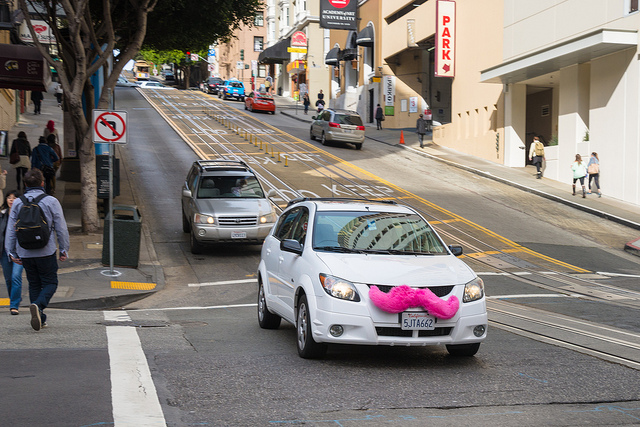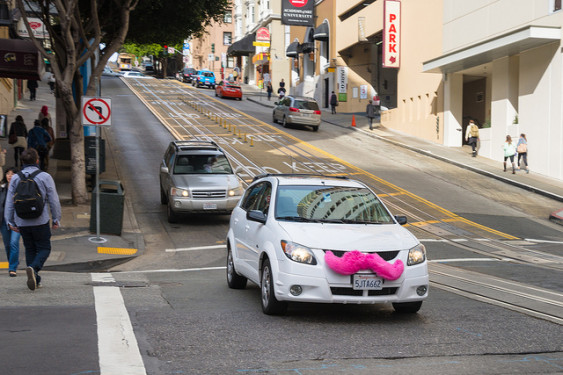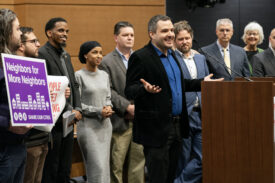Unless minds change in the next two weeks, Seattle appears headed towards capping the number of drivers who have turned their personal cars into vehicles-for-hire and have been working for companies like UberX, Lyft, and Sidecar, though city council members have not settled on where that cap should be.
Their working proposal would not limit the number of overall vehicles that those “Transportation Network Companies” (TNCs) can dispatch on their system, but companies like Lyft and UberX and Sidecar would also have to start adding taxis and licensed for-hire vehicles or limousines to their smartphone apps in order to grow or maintain their service.
Among other amendments, the council on Friday voted to abandon a confusing proposal that would have limited “casual” TNC drivers—ones who weren’t interested in sitting through the city’s two-day for-hire driver’s license class—to working 16 hours per week. Instead, TNC drivers can drive as many hours as they want but must take the same safety class as current taxi and for-hire drivers. The city will explore ways to streamline and focus that training on pertinent safety issues.
The Seattle City Council did not take a vote Friday on the contentious issue of whether to put caps on new TNC drivers, but at a committee meeting attended by every councilmember, at least five—Bruce Harrell, Sally Clark, Mike O’Brien, Kshama Sawant, and Jean Godden—expressed support for limiting new TNC drivers at some level during a two-year pilot program.
It remains to be seen whether companies like Lyft and Uber would be willing operate under the constraints of the proposed pilot program, as it’s currently envisioned, or whether the new ‘ridesharing’ companies will pack up and leave Seattle. That would severely curtail opportunities for people who’ve begin sharing space and offering rides in their personal cars for money.
The companies have objected to the proposed driver training requirements, insurance mandates that the city appears firm on, and, most importantly, the proposal that would cap the number of non-professional drivers who could stick a pink mustache on their Toyota and drive for Lyft or who have decided to invest in a black Prius and join the ranks of UberX drivers.
While some council members want a cap at 300 TNC drivers, Clark proposed changing it to 600 on Friday, and others argued for no cap at all. Many council members implored the TNC companies to share how many drivers they currently have on the road—a number that those companies have so far refused to disclose—and help inform the city’s upcoming decision.
At issue is the fact that the city has for decades heavily regulated the taxi and for-hire industry, which is overwhelmingly dominated by African and East Asian immigrants. The city currently limits the number of legal taxi (688) and for-hire vehicle licenses (195) and has historically been unwilling to issue new licenses that would have put more legal cars-for-hire on the road, fostered competition, and allowed more drivers to control their own businesses.
Since the new smartphone-based dispatch companies began popping up two years ago to help fill that demand, they have existed with no city oversight and with no limits on their driver numbers. That inequity has incensed taxi drivers who say they’re being forced to compete on an uneven playing field.
But customers—from Amazon workers to semi-employed actors to bar hoppers to disabled patrons—have leapt to the defense of the smartphone-based services. Throughout the city debate, many have argued that it makes no sense to impose the same constraints that have produced a dysfunctional taxi system that often delivers poor service on a wildly popular and beneficial transportation innovation. California, for instance, recently chose to impose health and safety regulations on TNCs but not to impose any caps.
Bagshaw, who along with Rasmussen publicly argued against placing caps on new TNC drivers in Seattle, said those companies are now providing important job opportunities for immigrants and people of color, as well as women, who are far underrepresented in the taxi industry:
Fairness to the immigration and refugee community is number one at this table. And I completely agree with that….We need more drivers, more for-hires, more TNCs. I don’t want us to get stuck on artificial limits. We need, simply, more options. And really this is the real social justice. We’ll have more jobs for more drivers, a faster response time for consumers and higher standards overall.
Other council members worry that lifting taxi caps overnight and allowing an unlimited number of TNC drivers will flood the market and drive down wages for existing taxi and for-hire drivers, some of whom have arguably been penalized for following the city’s innovation-stifling rules all these years.
A majority of council members appeared to agree that a two-year pilot program that moves the city more gradually towards an open system and supports those drivers in the meantime was a prudent—and fair—interim step. O’Brien, who brokered the compromise that a majority of council members seemed to endorse on Friday, described his thinking this way:
I’ve heard from a lot of friends who for sure are big fans of the new technology companies and I myself have used them and appreciate what they do. I also have letters from the Seattle Hotel Association, the restaurant community and the tech community saying they really what to preserve the innovation that’s happening, specifically without caps.
The question I ask is the Seattle Hotel Associations is this: Is it going to be okay with you if airbnb is operating illegally in this environment and providing the same service….and paying no taxes? Are the restaurants okay if the city council goes back and amends the food truck regulations to lift the cap we placed on how far they can be from existing restaurants?… Are the technology companies okay if we allow companies to come in and pirate their software?
Fundamentally, if we are saying it’s okay for companies to come in and operate illegally for a year or two and build up a customer base and expect we will bend our rules and regulations to meet their needs, that is a policy debate I am prepared to have, and we should have that. If that is not the case, and this is an exception and this only applies in this one instance and it just happens to be an instance where the people who are affected are largely low-income, people of color, and people from the immigrant and refugee community, I don’t see how we can support this without undermining all the work we’ve done in this city on race and social justice.
The Seattle City Council’s Committee on Taxi, For-Hire, and Limousine Regulations will meet next on February 27, when members are expected to take up further discussion of caps and resume voting on the legislation.









Neal
I don’t understand the assumption behind Mike O’Brien’s claim — that capping the number of medallions increases wages for taxi drivers. Shouldn’t limiting supply make drivers worse off by making them pay more to rent medallions?
The same effect should drive up taxi fares too, but I would think that both the public and drivers end up losing out to medallion owners. Granted, a few drivers own their medallions outright, but it’s a pretty small minority.
On the other side of the equation, shouldn’t the growth of TNCs push up wages? It seems to me like UberX, Sidecar, and Lyft are increasing demand for drivers’ labor, and that fits with the anecdotal evidence I’ve heard.
Any real evidence one way or the other?
Kim_O'Brien_Chicago
interesting — i have a cousin in Madison Wisconsin and they’re having problems with Lyft and Uber right now — the cab drivers are really upset about these services and the city has started to fine drivers..